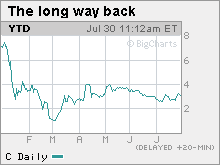It's official: You own a piece of Citi
Citigroup has converted a big chunk of the government's stake into common stock, meaning that taxpayers now have a 34% stake in the banking giant.
 |
| Even as Citi shares have rebounded in recent months, they still remain way below levels reached earlier this year. |
NEW YORK (CNNMoney.com) -- You now own a big piece of troubled bank Citigroup.
Although some housekeeping issues remain, Citigroup effectively completed its long-awaited plan to turn preferred shares owned by the government into common stock Thursday. That gives U.S. taxpayers a 34% stake in one of the world's largest financial institutions.
The New York City-based bank said Thursday that it converted a $25 billion preferred share stake the government acquired as part of rescue efforts for the firm taken earlier this year and last fall into common shares.
Facing concerns about its underlying health and ability to endure future losses, Citigroup (C, Fortune 500) agreed to the deal with the Treasury Department in late February.
By converting preferred shares into common stock, regulators hope to boost Citigroup's level of tangible common equity, a widely watched measure of a bank's ability to withstand losses.
Part of the agreement included the option for other preferred share investors to convert their holdings into common shares as well. About $58 billion worth of preferred and trust preferred securities have been exchanged to common stock as result of the exchange offer, according to the company.
Citigroup has earned a reputation as one of the nation's most troubled financial institutions. From the time the credit markets began to unravel in late 2007 up until the end of last year, the company lost more than $28 billion.
The bank's problems subsequently led the government to take a $45 billion stake in Citigroup to help stabilize the bank.
Following the conversion, the government will still own $20 billion in preferred shares on which it is earning an 8% dividend. Although the remaining amount could be converted if Treasury determines more assistance is needed, Citigroup officials have maintained that the company's position is quite secure.
"Following completion of the exchange offers, Citi will be among the best capitalized banks in the world," Citigroup CEO Vikram Pandit said in a statement about the exchange offer in June.
When the government first announced the stock conversion plans, there were fears about just how far the government would become involved in Citi's day-to-day operations, perhaps going so far as nationalize the company.
While regulators have stopped short of running the company, many of the recent changes among senior management and to the bank's board are widely believed to have been a result of government pressure.
And as one of the companies that has received extensive aid from the U.S. government, compensation packages for its highest-paid employees are now subject to scrutiny from the White House.
Still, conditions at the company appear to be less dire as of late thanks to signs that the U.S. economy may have hit bottom. Last quarter, the company reported a second-quarter profit of $4.3 billion, although its results were helped by its sale of its Smith Barney wealth management division to Morgan Stanley (MS, Fortune 500).
Talkback: Now that taxpayers own a sizeable piece of Citi, what do you think the government should do to get the bank back on track? Share your comments below. ![]()

